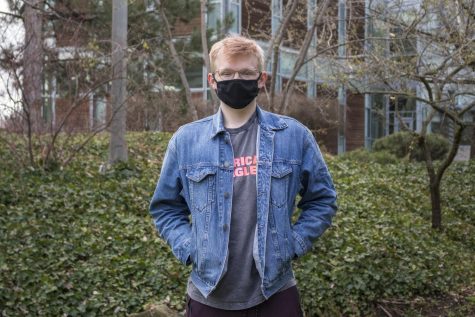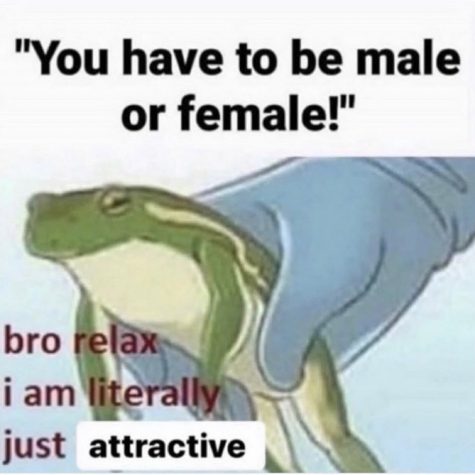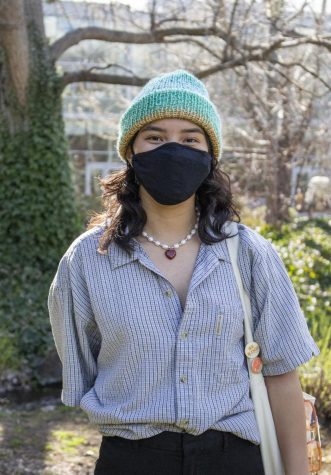Quarantine prompts students to reflect on their gender identity
March 25, 2021
COVID-19 lockdowns have allowed many Whitman students to face their identities in an intimate and consistent manner, resulting in many finding that their gender identity and preferred pronouns have changed in the past year.
Prior to Whitman, second-year Kyle Dygert [they/them] had never knowingly interacted with a member of either the trans or nonbinary communities.

Gender lingered in their mind all year but it wasn’t until a few weeks before students were sent home for quarantine that they entertained the thought of going by “they/them” pronouns following a night out with friends. By the end of 2020, Dygert had changed all social media bios to reflect their true identity.
“I put my foot down and said ‘This is who I am, I’m not going to let anyone trample over me anymore; because for the longest time I thought the only opinion that mattered was mine, but having people that can affirm your gender alongside you is really helpful,” Dygert said.
After working in customer service in the Tri-Cities and remaining closeted during quarantine, they’ve switched to using they/them pronouns at Whitman and feel a sense of rebirth.
“It feels warm, I no longer feel cold about myself,” Dygert said.
Dygert went on to expand on some struggles that came along with their newfound sense of identity and the implications of continuing to be perceived differently by the world than how they saw themselves.
“Socially people may see me as a man, and I understand, I’m more masculine presenting and I have a deeper voice, but I like to remind them that looks aren’t everything. Take a second and look into me further because there are so many layers,” Dygert said.
Dygert reflected on an experience on campus after being vocal in a Zoom meeting about being misgendered in their own house for the first few weeks.
“There was no confrontation or unnecessary apology, but the next day everyone just switched,” Dygert said.
Whitman contains plenty of toxic masculinity and gendered language, but Dygert has carved out space for themself and continues to feel a sense of hope and affirmation within many communities on campus.
They hope that more people will educate themselves on the importance of respecting others identities and pronouns, as well as feel free to explore their own gender identities.
“Having more people come out can help us understand where we’re all at,” Dygert said.
Junior Clara Epelman [she/they] shares in the sense of liberation and warmth that comes with claiming new pronouns. After first being exposed to the idea of gender-fluidity through TikTok, they remember feeling negative emotions that she struggled to understand,
“It was not anger, it was jealously; the little bit of sadness that I wasn’t presenting myself that way,” Epelman said.
Deciding to present their pronouns in their bio was a big, and difficult step to take. They deleted them and added them back many times while continuing to work through complicated emotions and fears.
“It’s really scary because you have to be so public about it if you want to be respected . . . sometimes I don’t know if I want the whole world to know,” Epelman said.
They realize the journey ahead may be difficult to navigate when it comes to figuring out how to feel most comfortable in social situations.
“It just means I have more reflection and dismantling of mental schemas to do,” Epelman said.
Epelman reflected on how changes to their body growing up, and their relationship with those changes may have informed their understanding of themselves and their identity.

“I didn’t realize how much I loved being curveless until I became a little curvier,” Epelman said.
Lockdown allowed Epelman to dive deeper into their gender fluidity and position themselves within their cultural and familial environment.
“I am white-passing, but I’m Latinx,” Epelman said.
For Epelman, these intersectional identities mean grappling with culturally significant beliefs and even shame. Weighing the option of coming out or keeping quiet brings up strong emotions.
“I’m not even out to my family . . . internally it would be so stressful for them,” Epelman said.
On-campus, Epelman has struggled to find people actively addressing her with both she and they pronouns.
“I understand that part of that is because I’m not very vocal,” Epelman said.
However, she is committed to continuing the conversation with close friends and themself.
“I simply cannot ignore the euphoria I feel when I’m referred to as a they,” Epelman said.
Jennifer Wong [they/she], a second year on the tennis team, spoke about their evolving gender identity throughout this past year as well. Once lockdowns went into effect, they were able to pay attention to the ways in which their gender defined their daily life.

“I think gendered performance and social interaction go hand in hand, so when that disappeared, I was able to question what my gender really meant to me,” Wong said.
Additionally, she spoke about the complexities of being underrepresented in the nonbinary community.
Referring to the stereotypical image of androgynous people in media as white, short-haired, thin people in baggy clothes, Wong reflects that“ I don’t necessarily fit into two of the three common characteristics that are usually AND wrongly linked to non-binary identity: whiteness and androgyny.”
Wong identifies with the AAPI (Asian Americans and Pacific Islanders) community as well as the nonbinary community and is continuing to explore the intersections of these two groups.
“I’m also someone that’s affected by both misogyny and racial fetishization. And sometimes I feel as though part of my gender dysphoria is linked to this desire to escape—specifically from this fetishization,” Wong said.
On March 16, when a white gunman in Atlanta targeted day spas and killed six women belonging to the AAPI community, Wong was shaken.
“The deaths of last week just make me feel sick because I see myself there,” Wong said.
They argue that existing systems of white supremacy and imperialism within the United States have been leading motivators for such acts of terrorism.
“It always begins with second-guessing someone’s attraction to an Asian woman,” Wong said. “On a less extreme but still harmful scale, you get hypersexualized. On the extreme end, woman-aligned Asians who experience misogyny are murdered in cold blood by white supremacists.”
Increasing incidents of identity based violence, as well as a year of tension and reflection has brought many trans and non-binary people farther into view. It is important that we continue to educate ourselves on issues of identity, and embrace opportunities for further reflection, especially when it comes to thinking about intersections of gender.





